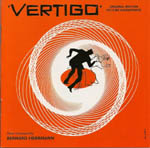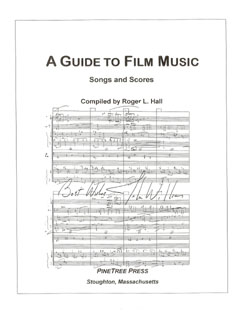60th anniversary tribute!

“Vertigo was not only the high point of Herrmann’s work with Hitchcock, it was also the first in a series of film and TV scores that marked, arguably, Herrmann’s most prolific and inventive period,
from 1958 to 1963.” – Steven C. Smith, A HEART AT FIRE’S CENTER: The Life and Music of Bernard Herrmann, p. 222
VERTIGO – Bernard Herrmann’s great film score

Sixty years ago, Alfred Hitchcock directed what is considered by many, including this writer, to be his most distinctive film. It starred James Stewart and Kim Novak, with an outstanding supporting cast, especially the wonderful Barbara Bel Geddes.
For the music score, Hitchcock once again chose Bernard Herrmann, who produced his fourth score for Hitch.
Writing about these two significant creators in their respective fields, Dan Auiler has written:
“Herrmann was Hitchcock’s temperamental opposite. When he felt a musician or a fellow composer wasn’t meeting his own standards of perfection, Herrmann was capable of flying into fits of rage. As the head of MGM’s music department recalled to [Steven] Smith: ‘I think Benny Herrmann committed suicide. Unwittingly; not with drugs, not with a pistol, but with a four-letter word called hate. I’m convinced that he filled his life with unneeded stress and tension.’ But somehow, the artistic sensibilities of these two artists was enough to bridge emotional differences. Perhaps it was Herrmann’s respect for Hitchcock’s abilities as a film director. Perhaps it was Hitchcock’s working style, which allowed fellow artists to work at their own pace and on their own, leaving Herrmann to contribute without confrontation.”
— VERTIGO: THE MAKING OF A HITCHCOCK CLASSIC, 1998, pages 138-39.
When it was first released, many didn’t understand the plot of VERTIGO and the critics didn’t like it much either. Yet when I first watched it at my local movie palace in New Jersey back in 1958, I knew it was something special and Herrmann’s score was a driving force that made the film so unforgettable.
When it was fully restored and I watched it again in the 1990s, I remembered why I enjoyed it so much. The combination of the suspenceful and intense love story combined with a swirling and beautiful score make it superb entertainment as well as an artistic achievement. It has remained a favorite film of mine and I believe it is Herrmann’s best score for a Hitchcok film.
Some have complained about the unbelievable story line, but as Hitchcok would say: “It’s only a movie.” But what a movie!
VERTIGO is a film and score that every film lover should savor like fine vintage wine. The film and music may go down smoothly at first glance but be careful for that kick at the end!
— Roger Hall, 17 March 2018
Recommended CDs
There are two CDs of the soundtrack that are recommended, both released by Varese Sarabande.
First the original soundtrack, conducted by Muir Mathieson. Herrmann was angry because he was not allowed to conduct because of a labor dispute, as Dan Auiler reports it:
“Herrmann was never happy with the Mathieson recordings. At the time, [Herbert] Coleman wrote to the director of the Vienna orchestra that Hitchcock and Herrmann were happy with the results, although the letter hints that there may have been complaints — among them a certain dissatisfaction ‘about the heavy bowing sound from the strings.’ But the letter goes on to assert that the that was exactly the effect Herrmann had been after…Later, though, Herrmann would contend that the recordings were sloppy and full of mistakes. Newly restored and re-released in 1996, the recording does reveal some sloppiness on the part of the musicians.”
Even with the mistakes, this is still a most appealing original soundtrack recording:

And you can compare the original soundtrack with the excellent re-recording CD with the Royal Scottish National Orchestra, conducted by Joel McNeely:

Film Song

Strangely, considering the film’s story, there was also a song written for the film but not by Herrmann. The song was written by the songwriting team of Jay Livingston and Ray Evans, who had already received three Oscars, including one for a Hitchcock film, “Que Sera, Sera (What Will Be, Will Be)” from THE MAN WHO KNEW TOO MUCH (1956).
Dan Auiler has written this about the song:
“According to the songwriters, Hitchcock approached them for VERTIGO hoping that they would help familiarize audiences with the concept. ‘Gentlemen, the studio thinks that no one knows what the word vertigo means,’ Hitchcock explained to the team. ‘But that’s what my picture is about, and if you will write a song explaining what the the word vertigo means, it will help me a great deal.’ They wrote the song — with references to dizzying heights– and recorded a demo. The team submitted their work, but may well have been relieved when Hitchcock decided not to use it. Paramount, on the other hand, was plugging the song on all the advance theater advertisements for VERTIGO; they couldn’t have been happy about its demise.”
Though the VERTIGO song was never used in the film, the sheet music is now a much sought after collector’s item.
Hear a recording of this song sung by Billy Eckstine on YouTube — click here
DVD and Book

VERTIGO
In 1996, The New York Film Critics Circle, which has been making awards since 1935, gave its “Most Distinguished Re-Issue” award to VERTIGO.

There are several books on the subject of VERTIGO but this one by Dan Auiler is the best choice. It includes a section devoted to Herrmann’s brilliant score.

Film music historian and critic, Roger Hall, writes about VERTIGO
and other Bernard Herrmann film scores. To read more about this publication,
A GUIDE TO FILM MUSIC: Songs and Scores.
now in its 7th edition — click here
